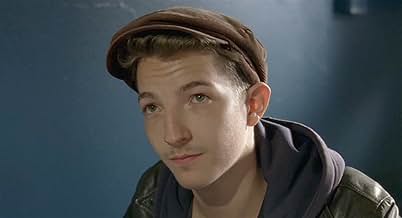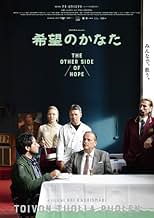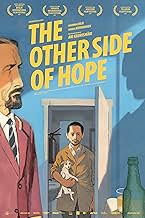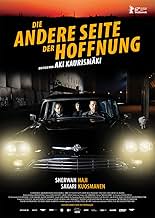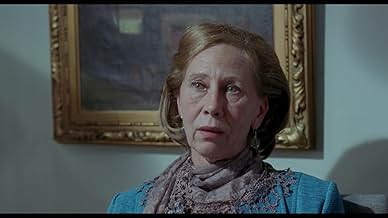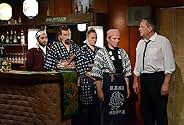CALIFICACIÓN DE IMDb
7.2/10
14 k
TU CALIFICACIÓN
El propietario de un restaurante, jugador de póquer y antiguo agente comercial, hace amistad con un grupo de refugiados recién llegados a Finlandia.El propietario de un restaurante, jugador de póquer y antiguo agente comercial, hace amistad con un grupo de refugiados recién llegados a Finlandia.El propietario de un restaurante, jugador de póquer y antiguo agente comercial, hace amistad con un grupo de refugiados recién llegados a Finlandia.
- Premios
- 8 premios ganados y 24 nominaciones en total
Abdi Jama
- Aseman kassa
- (as Abdi alias 'Lii' Jama)
Simon Al-Bazoon
- Mazdak
- (as Simon Hussein Al-Bazoon)
- Dirección
- Guionista
- Todo el elenco y el equipo
- Producción, taquilla y más en IMDbPro
Opiniones destacadas
Finnish director, Aki Kaurismäki has successfully established himself as a respectable auteur in world cinema. When it was announced after the release of Kaurismäki's last film "Le Havre" (2011) that it would be followed by another film covering similar topics and themes, audiences have been anxiously waiting for his next effort. Thus, six years later, comes "The Other Side of Hope" (2017, "Beyond Hope" literally), a film that Kaurismäki wanted to get out before it was too late. One should not be surprised by such openness about the film's political agenda given Kaurismäki's usual tendencies to do so. Nor should one be surprised by the fact that "The Other Side of Hope" is everything one could expect from Kaurismäki: an immediately recognizable film belonging to the canon of his oeuvre. While some Finnish critics have been disappointed by the lack of innovation or regeneration from Kaurismäki, they have failed to appreciate that often the best artists keep doing the "same" over and over again -- think of Ozu and Hawks, for instance, both of whom Kaurismäki adores tremendously.
Like "Le Havre", "The Other Side of Hope" also tells the story about a refugee encountering a European local. The small port town of Le Havre in France has been changed to Helsinki in Finland and the North-African refugee to a Syrian. The film follows Khaled's (played by Sherwan Haji) day- to-day activities in the red tape of immigration policy, his attempts to track down his lost sister, and his conflicts with locals as well as a parallel story about a Finnish man (played by Kaurismäki regular Sakari Kuosmanen) who leaves his wife and starts up a restaurant which eventually leads him to meet Khaled.
As mentioned above, one can recognize the film as Kaurismäki's instantly. The cinematography is often static by nature (even camera movement is rather mechanic), the acting is deadpan and the actors' delivery is laconic to the bone, there is nostalgic popular music, and mise-en-scène is characterized by vintage elements from old cars to type writers as well as classic Hollywood lighting. These cinematic means often give an ironic impression which, nonetheless, never reduces the film to a parody of itself; it manages to take itself seriously while joking around, so to speak. They also constitute an extremely economic narrative where a wordless act such as the placing of a ring on a kitchen table can say more than a thousand words. In terms of tone, Kaurismäki's film lies securely in between of tragedy and comedy, cynicism and humanism, melancholy and laughter.
In this world of deep contradictions -- not only in tone, of course, but also in, say, the co- existence of vintage elements in mise-en-scène with modern technology -- Kaurismäki's characters often find themselves to be strangers. They are strangers essentially in two senses. First, they are strangers of society; they are thugs, loners, divorced, unemployed, homeless, and refugees. Second, they are strangers of existence; their being in the world is twisted in the sense that they talk absurdly little, do not notice the absurdities of the fictive world with its contradictions, stand still for long periods of time, and can suddenly announce that they will move to Mexico City for a change of scenery without giving rise to any trace of astonishment in their interlocutors.
It seems to me that Kaurismäki's phenomenology of strangeness, if I may give it such a hasty word, has gained significant new dimensions in his contemporary cinema of global ethics. The strangers of "The Other Side of Hope" find comrades in each other without a need to announce it. They are the global working class with no nation. They are a plural bunch whose shared humanity overcomes individual differences. In a key scene echoing "Le Havre", there is a moving montage of human faces as the refugees in the reception center listen to a wordless ballad by Khaled. It is a very Kaurismäki-esque moment of cinematic personality, but here the strangeness seems to articulate heavily moral meanings in particular.
While the film is unapologetically moral and political in its message and agenda, it also comes across as a good piece of cinema with a poetry all its own (that is, the cinematic poetry of Kaurismäki's cinema in general, to be precise). Like many other films by Kaurismäki, sea is an essential element, which might represent the film's success in finding a place between poetry and politics. "The Other Side of Hope" begins with a beautiful shot of the Baltic Sea. To Peter von Bagh, a Finnish film critic and historian, all cinematic images of sea are masterful. The beauty of the sea is easily captured in a way which makes everyone a master. Yet, in order for us to care about these images, something has to happen -- either in terms of story, theme, or aesthetics -- in their appropriate contexts. In this sense, Kaurismäki delivers. The other side of hope, or its vague image in the world beyond, finds its elusive face on the surface of the sea. When Peter von Bagh passed away in 2014, Kaurismäki promised to dedicate his next film to von Bagh's memory, adding that "only if it is good enough." He did.
Like "Le Havre", "The Other Side of Hope" also tells the story about a refugee encountering a European local. The small port town of Le Havre in France has been changed to Helsinki in Finland and the North-African refugee to a Syrian. The film follows Khaled's (played by Sherwan Haji) day- to-day activities in the red tape of immigration policy, his attempts to track down his lost sister, and his conflicts with locals as well as a parallel story about a Finnish man (played by Kaurismäki regular Sakari Kuosmanen) who leaves his wife and starts up a restaurant which eventually leads him to meet Khaled.
As mentioned above, one can recognize the film as Kaurismäki's instantly. The cinematography is often static by nature (even camera movement is rather mechanic), the acting is deadpan and the actors' delivery is laconic to the bone, there is nostalgic popular music, and mise-en-scène is characterized by vintage elements from old cars to type writers as well as classic Hollywood lighting. These cinematic means often give an ironic impression which, nonetheless, never reduces the film to a parody of itself; it manages to take itself seriously while joking around, so to speak. They also constitute an extremely economic narrative where a wordless act such as the placing of a ring on a kitchen table can say more than a thousand words. In terms of tone, Kaurismäki's film lies securely in between of tragedy and comedy, cynicism and humanism, melancholy and laughter.
In this world of deep contradictions -- not only in tone, of course, but also in, say, the co- existence of vintage elements in mise-en-scène with modern technology -- Kaurismäki's characters often find themselves to be strangers. They are strangers essentially in two senses. First, they are strangers of society; they are thugs, loners, divorced, unemployed, homeless, and refugees. Second, they are strangers of existence; their being in the world is twisted in the sense that they talk absurdly little, do not notice the absurdities of the fictive world with its contradictions, stand still for long periods of time, and can suddenly announce that they will move to Mexico City for a change of scenery without giving rise to any trace of astonishment in their interlocutors.
It seems to me that Kaurismäki's phenomenology of strangeness, if I may give it such a hasty word, has gained significant new dimensions in his contemporary cinema of global ethics. The strangers of "The Other Side of Hope" find comrades in each other without a need to announce it. They are the global working class with no nation. They are a plural bunch whose shared humanity overcomes individual differences. In a key scene echoing "Le Havre", there is a moving montage of human faces as the refugees in the reception center listen to a wordless ballad by Khaled. It is a very Kaurismäki-esque moment of cinematic personality, but here the strangeness seems to articulate heavily moral meanings in particular.
While the film is unapologetically moral and political in its message and agenda, it also comes across as a good piece of cinema with a poetry all its own (that is, the cinematic poetry of Kaurismäki's cinema in general, to be precise). Like many other films by Kaurismäki, sea is an essential element, which might represent the film's success in finding a place between poetry and politics. "The Other Side of Hope" begins with a beautiful shot of the Baltic Sea. To Peter von Bagh, a Finnish film critic and historian, all cinematic images of sea are masterful. The beauty of the sea is easily captured in a way which makes everyone a master. Yet, in order for us to care about these images, something has to happen -- either in terms of story, theme, or aesthetics -- in their appropriate contexts. In this sense, Kaurismäki delivers. The other side of hope, or its vague image in the world beyond, finds its elusive face on the surface of the sea. When Peter von Bagh passed away in 2014, Kaurismäki promised to dedicate his next film to von Bagh's memory, adding that "only if it is good enough." He did.
Saw this at the Berlinale 2017, where it was part of the official competition for the Golden Bear. The synopsis on the festival website was not really promising, but my prejudice disappeared gradually during the screening. Although the movie has a certain inclination to become a fairy tale where everyone will live happily ever after, the ending has some darker sides to downplay the assumed optimistic story. One of these darker sides lies in the several times appearing "Finland security" men, who are up to no good.
Our first main protagonist Khaled is seeking asylum in Finland. From the outside, it looks like a very clean process as far as shown to us. The idle waiting time related to the asylum application procedure does hide the rough edges we often read about, namely that asylum seekers among themselves are making trouble when seeing others with a different religion or other political position, or even worse when seeing GLBT behavior that they are not prepared to allow. Intolerance can be very problematic here, given that the people are packed together, while at the same time being bored to death, doomed to wait, unable to do anything useful. Due to their numbers and possible variations in asylum seekers, it is a sheer impossible task to sort and separate them in such a way that such troubles are prevented. In this movie, however, the asylum seekers are living harmoniously together, and help each other where they can without seeking favors in return. What does Finland do what we apparently are doing wrong in The Netherlands??
Our second main protagonist Wikström follows a completely different path. On a random morning, he leaves his wedding ring and house keys with his wife, who is clearly alcohol addicted. He sells his stock but keeps the storage space (will become unexpectedly useful later). What also proves useful is his poker face, and he succeeds in multiplying his amount of cash considerably, to the extent that he can buy a restaurant including staff. The capabilities of the restaurant staff that he takes over with the rest of the inventory and furniture, do not look very promising from the outset, but he keeps them nevertheless.
For the first 30 minutes or so, the stories of above two main protagonists run their completely separate course. We see them in turns, both paths clearly delineated, simply by having other people and another decor visible. After his asylum request being denied, and just before being transported to a plane to be sent back, Khaled escapes and starts an uncertain life on the street. He is found sleeping between the trashcans by fresh restaurateur Wikström, from which moment on their lives become mingled.
The restaurant business does not go as well as may be hoped. Given the quality of the staff that he inherited when buying the restaurant, it can be no surprise from the first day on. For example, when someone orders sardines from the menu, that seems to mean that he receives a half opened can. More humor follows later on when they try out different restaurant types, e.g. sushi being prepared out of a cooking book. Other experiments also hardly succeed. A surprise inspection is handled in a way not exactly by-the-book but they pass. These humoristic scenes are intermixed with the more serious main line of the story.
The story includes a series of lucky strikes and happy coincidences that is overwhelming, bordering on statistically impossible. But otherwise there would have been no story to tell, so who am I to complain. The musical fragments we witnessed, most in cafés or restaurants, even one where Khaled plays the sitar (is that the proper name?), albeit not relevant to the story itself, are included (I think) as ornamentation or as local folklore, or simply happened to be available and deemed a waste when left out.
All in all, this movie is much better than what the average synopsis promises. On the other hand, it is not easy to describe what it is exactly that makes the movie attractive. The serious undertone cannot be overlooked, given the hostilities encountered by Khaled, and the motivation for the denial of his asylum request is also a farce, based on wrong facts that we see refuted on TV, and gives Finland a bad name. However, the parallel story with Wikström and his restaurant takes good care of ample relief from the heavy material. I usually lower my expectations when a book or movie builds on two or more parallel story lines, by assuming that none of the stories could offer sufficient material to stand on its own feet, but this time my prejudice proved unjustified. The way both stories were mixed without disturbing the logical flow of events, may be one of the reasons this movie was awarded by the International Jury of the Berlinale 2017.
Our first main protagonist Khaled is seeking asylum in Finland. From the outside, it looks like a very clean process as far as shown to us. The idle waiting time related to the asylum application procedure does hide the rough edges we often read about, namely that asylum seekers among themselves are making trouble when seeing others with a different religion or other political position, or even worse when seeing GLBT behavior that they are not prepared to allow. Intolerance can be very problematic here, given that the people are packed together, while at the same time being bored to death, doomed to wait, unable to do anything useful. Due to their numbers and possible variations in asylum seekers, it is a sheer impossible task to sort and separate them in such a way that such troubles are prevented. In this movie, however, the asylum seekers are living harmoniously together, and help each other where they can without seeking favors in return. What does Finland do what we apparently are doing wrong in The Netherlands??
Our second main protagonist Wikström follows a completely different path. On a random morning, he leaves his wedding ring and house keys with his wife, who is clearly alcohol addicted. He sells his stock but keeps the storage space (will become unexpectedly useful later). What also proves useful is his poker face, and he succeeds in multiplying his amount of cash considerably, to the extent that he can buy a restaurant including staff. The capabilities of the restaurant staff that he takes over with the rest of the inventory and furniture, do not look very promising from the outset, but he keeps them nevertheless.
For the first 30 minutes or so, the stories of above two main protagonists run their completely separate course. We see them in turns, both paths clearly delineated, simply by having other people and another decor visible. After his asylum request being denied, and just before being transported to a plane to be sent back, Khaled escapes and starts an uncertain life on the street. He is found sleeping between the trashcans by fresh restaurateur Wikström, from which moment on their lives become mingled.
The restaurant business does not go as well as may be hoped. Given the quality of the staff that he inherited when buying the restaurant, it can be no surprise from the first day on. For example, when someone orders sardines from the menu, that seems to mean that he receives a half opened can. More humor follows later on when they try out different restaurant types, e.g. sushi being prepared out of a cooking book. Other experiments also hardly succeed. A surprise inspection is handled in a way not exactly by-the-book but they pass. These humoristic scenes are intermixed with the more serious main line of the story.
The story includes a series of lucky strikes and happy coincidences that is overwhelming, bordering on statistically impossible. But otherwise there would have been no story to tell, so who am I to complain. The musical fragments we witnessed, most in cafés or restaurants, even one where Khaled plays the sitar (is that the proper name?), albeit not relevant to the story itself, are included (I think) as ornamentation or as local folklore, or simply happened to be available and deemed a waste when left out.
All in all, this movie is much better than what the average synopsis promises. On the other hand, it is not easy to describe what it is exactly that makes the movie attractive. The serious undertone cannot be overlooked, given the hostilities encountered by Khaled, and the motivation for the denial of his asylum request is also a farce, based on wrong facts that we see refuted on TV, and gives Finland a bad name. However, the parallel story with Wikström and his restaurant takes good care of ample relief from the heavy material. I usually lower my expectations when a book or movie builds on two or more parallel story lines, by assuming that none of the stories could offer sufficient material to stand on its own feet, but this time my prejudice proved unjustified. The way both stories were mixed without disturbing the logical flow of events, may be one of the reasons this movie was awarded by the International Jury of the Berlinale 2017.
Remember the pretty boy Ronan Keating singing that you say it best when you say nothing at all? Of course you don't, you only listen to good music. But this could be the very motto of Finnish legendary moviemaker Aki Kaurismäki's latest. This minimalist masterpiece is so achingly simple and elegant and yet so complex in a good way, that there's no really good way to describe it, if you don't understand Kaurismäki's style already. Toivon tuolla puolen" (The Other Side of Hope" in English, Teispool lootust" in Estonian") is like a haiku: it can convey so much with so little words and even so little action. I can't find fitting comparisions here, but Kaurismäki comes across like Jim Jarmusch's less snobish cousin: even more concentrated on what it's like to be human and small things that life is actually made of. They both value storytelling through details but Kaurismäki's approach is more mainstreamfriendly: you don't have to invest yourself fully all the time to make sense of what's going on exactly. Toivon tuolla puolen" offers two bittersweet stories interwining, about refugee in strange and hostile land and old entrepreneur who leaves his wife and finds fresh start in running a diner. It often feels like comedy – Kaurismäki's approach could be called Finnish version of Soviet nostalgia that many 30-year or older viewers will respond to and enjoy. Judging by Estonian premiere, it's a real crowdpleaser. But deeper down it's more about bleak and sad side of human existence: loneliness, being unwanted, trying to find purpose when everything has fallen down. And, of course, about how there's no winning with nowadays' refugee crisis – it brings suffering for everyone involved, except for maybe those who like to attack people who shouldn't be here". I give this quietly hilarious and heartbreaking masterpiece a near- perfect score. Although it doesn't break new grounds for Kaurismäki, I can't think of a way how it could be improved in any meaningful way. The movie's not gonna satisfy everybody, nothing will, but it's almost perfect the way it is. Deceptively simple but powerful experience that you can't imagine getting from anybody else than Kaurismäki.
After 'Le Havre', this is Kaurismäki's second film about refugees. This is a hot topic, now even more than ever. Europe is still trying to digest the influx of refugees from Syria and Iraq, a process with major political consequences.
There is no doubt about Kaurismäki's moral position. The lead characters in 'The other side of hope' don't even discuss if they should help the Syrian refugee Khaled, they just do it as if there is no other choice. In perhaps Kaurismäki's most political scene ever, a police officer tells Khaled that Aleppo, the city where he came from, is not unsafe according to the Finnish immigration authority, so he should be deported back to Syria. Immediately after the verdict, Kaurismäki shows a news report on Finnish television about the atrocities going on in Aleppo.
The complete lack of emotions, a trademark feature of Kaurismäki's work, adds an extra dimension to the message. The refugee doesn't complain, his protectors don't discuss, the violent racists don't explain. Everything just happens.
Of course, this being a Kaurismäki film, there are the typical elements of his movies: the fifties aesthetics, the deadpan humor, the stripped-to-the-bone dialogue. Music is also an important element in this film. It is, without exception, source music from musicians playing in bars, café's or in the street. It is all sung in Finnish, but has a very bluesy feeling, perfectly matching the overall mood of the film.
The screenplay has a special structure: for the most part of the film, the viewer is watching two separate stories. One is about the refugee Khaled entering the country as a stowaway in a cargo ship, trying to find his way in society and being processed by the immigration authority. The other is about a business man trying to revive an unprofitable restaurant. Of course, the two are destined to run into each other.
Kaurismäki is one of those film makers whose style is unique and doesn't resemble anything else. For that reason alone, his work is worth watching. In this film, he adds a political message which is as urgent as can be.
There is no doubt about Kaurismäki's moral position. The lead characters in 'The other side of hope' don't even discuss if they should help the Syrian refugee Khaled, they just do it as if there is no other choice. In perhaps Kaurismäki's most political scene ever, a police officer tells Khaled that Aleppo, the city where he came from, is not unsafe according to the Finnish immigration authority, so he should be deported back to Syria. Immediately after the verdict, Kaurismäki shows a news report on Finnish television about the atrocities going on in Aleppo.
The complete lack of emotions, a trademark feature of Kaurismäki's work, adds an extra dimension to the message. The refugee doesn't complain, his protectors don't discuss, the violent racists don't explain. Everything just happens.
Of course, this being a Kaurismäki film, there are the typical elements of his movies: the fifties aesthetics, the deadpan humor, the stripped-to-the-bone dialogue. Music is also an important element in this film. It is, without exception, source music from musicians playing in bars, café's or in the street. It is all sung in Finnish, but has a very bluesy feeling, perfectly matching the overall mood of the film.
The screenplay has a special structure: for the most part of the film, the viewer is watching two separate stories. One is about the refugee Khaled entering the country as a stowaway in a cargo ship, trying to find his way in society and being processed by the immigration authority. The other is about a business man trying to revive an unprofitable restaurant. Of course, the two are destined to run into each other.
Kaurismäki is one of those film makers whose style is unique and doesn't resemble anything else. For that reason alone, his work is worth watching. In this film, he adds a political message which is as urgent as can be.
The Other Side of Hope tackles a timely matter, the refugee crisis in Europe in the wake of the ISIL wars, with a wry and deadpan sense of humour, resulting in a product with a lot of personality and colour. It's a Finnish film that received international attention but doesn't present the Finns themselves in a totally positive light- but then, we know the Finns haven't been the only ones to show a complete lack of humanity and empathy towards those who've suffered so much.
The film boasts a number of memorable characters, particularly Waldemar Wikström, who purchases a restaurant called The Golden Pint while looking for a new line of work after a separation. A profitable business, he is told, because people drink when times are bad, and more when times are good. He finds himself leading a staff of three Finns, then a dog, and finally Khaled, a Syrian refugee only looking for his sister. Wikström brings Khaled in after the courts decide, rather dubiously, that there is no war in Aleppo.
The Other Side of Hope isn't naive in imagining a harmonious outcome for everyone. It brings us a vision of hardships that nevertheless, with its humour and hope, inspires, and brings a smile to the face.
The film boasts a number of memorable characters, particularly Waldemar Wikström, who purchases a restaurant called The Golden Pint while looking for a new line of work after a separation. A profitable business, he is told, because people drink when times are bad, and more when times are good. He finds himself leading a staff of three Finns, then a dog, and finally Khaled, a Syrian refugee only looking for his sister. Wikström brings Khaled in after the courts decide, rather dubiously, that there is no war in Aleppo.
The Other Side of Hope isn't naive in imagining a harmonious outcome for everyone. It brings us a vision of hardships that nevertheless, with its humour and hope, inspires, and brings a smile to the face.
¿Sabías que…?
- TriviaThe actors playing siblings Khaled and Miriam are real-life siblings.
- ConexionesFeatured in Ismo Haavisto One Man Band: Midnight Man (2017)
- Bandas sonorasOi mutsi, mutsi
Written and performed by Tuomari Nurmio
Selecciones populares
Inicia sesión para calificar y agrega a la lista de videos para obtener recomendaciones personalizadas
- How long is The Other Side of Hope?Con tecnología de Alexa
Detalles
- Fecha de lanzamiento
- Países de origen
- Sitios oficiales
- Idiomas
- También se conoce como
- The Other Side of Hope
- Locaciones de filmación
- Helsinki, Finlandia(The city)
- Productoras
- Ver más créditos de la compañía en IMDbPro
Taquilla
- Presupuesto
- EUR 1,600,000 (estimado)
- Total en EE. UU. y Canadá
- USD 183,943
- Fin de semana de estreno en EE. UU. y Canadá
- USD 15,495
- 3 dic 2017
- Total a nivel mundial
- USD 4,282,973
- Tiempo de ejecución1 hora 40 minutos
- Color
- Mezcla de sonido
- Relación de aspecto
- 1.85 : 1
Contribuir a esta página
Sugiere una edición o agrega el contenido que falta

Principales brechas de datos
By what name was El otro lado de la esperanza (2017) officially released in India in English?
Responda

